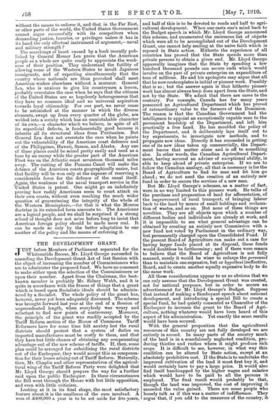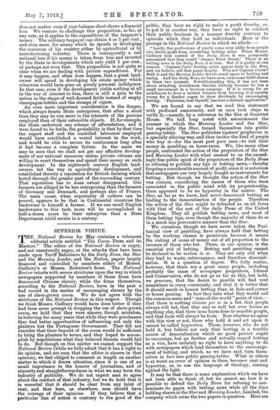1.11.6 DEVELOPMENT GRANT.
JUST before Members of Parliament separated for the Whitsuntide Recess, Mr. Lloyd George succeeded in amending the Development Grant Act of last Session with the object of increasing the number of Commissioners who are to administer the proposed fund. We have no comment to make either upon the selection of the Commissioners or upon their number. Apart from the Chairman, the best- known member is probably Mr. Sidney Webb, and it is quite in accordance with the fitness of things that a grant which is based upon Socialistic ideals should be adminis- tered by a Socialist. The whole policy of the grant has, however, never yet been adequately discussed. The scheme was brought forward last year at the end of a Session of unprecedented length, when everybody was weary and reluctant to find new points of controversy. Moreover, the principle of the grant was readily accepted by the Tai4ff Reform section of the House of Commons. Tariff Reformers have for some time felt anxiety lest the rural districts should protest that a system of duties on imported manufactures must be costly to them, and that they have but little chance of obtaining any compensating advantage out of the new scheme of tariffs. If, then, some plan could be arranged for subsidising the rural districts out of the Exchequer, they would accept this as compensa- tion for their losses arising out of Tariff Reform. Naturally, then, Mr. Chaplin and other representatives of the agricul- tural wing of the Tariff Reform Party were delighted that Mr. Lloyd George should prepare the way for a further raid upon the public Exchequer. In these circumstances the Bill went through the House with but little opposition, and even with little criticism.
Looking at it in its final shape, the most satisfactory feature about it is the smallness of the sum involved. A sum of £400,000 a year is to be set aside for five years, and half of this is to be devoted to roads and half to agri- cultural development. When one casts one's mind back to the Budget speech in which Mr. Lloyd George announced this scheme, and enumerated the enormous list of objects which were all to be accomplished out of the Development Grant, one cannot help smiling at the naive faith which is reposed in State action. Hitherto the experience of all countries has proved that the State spends more than private persons to obtain a given end. Mr. Lloyd George apparently imagines that the State by spending a few hundred thousand pounds can secure ends which would involve on the part of private enterprise an expenditure of tens of millions. He and his apologists may argue that all that he now contemplates is initial or pioneer work. Possibly that is so ; but the answer again is that hitherto pioneer work has almost always bee done apart from the State, and not by the State. We admit that there are cases to the contrary. For example, Canada has for many years possessed an Agricultural Department which has proved of extraordinary value to the farmers of the Dominion. The reason is that the Canadian Government had the intelligence to appoint an exceptionally capable man to the permanent headship of the Department, and left him practically a free hand. He has moulded. the policy of the Department, and it deliberately lays itself out to try experiments, to investigate new methods, and to propagate new ideas. Directly it has succeeded in getting one of its new ideas taken up commercially, the Depart- ment leaves that matter alone and is off to something else. In other words, the Canadian Agricultural Depart- ment, having secured an adviser of exceptional ability, is able to keep ahead of private enterprise. If we are to follow the Canadian analogy, all that is necessary is for the Board of Agriculture to find its man and let him go ahead ; we do not need the creation of an entirely new fund in order to secure the services of a new man But Mr. Lloyd George's schemes, as a matter of fact, were in no way limited to this pioneer work. He talks of the purchase and preparation of land for afforestation, of the improvement of rural transport, of bringing labour back to the land by means of small holdings and reclama- tion of wastes, and so on. But none of these things are novelties. They are all objects upon which a number of different bodies and individuals are already at _work, and it is impossible to see what general advantage can be obtained by creating an entirely new Commission with a new fund not voted by Parliament in the ordinary way, but permanently charged upon the Consolidated Fund. If the present Board of Agriculture can make out a case for having larger funds placed at its disposal, these funds would doubtless-be forthcoming ; and if there were reason to believe that the Board of Agriculture is not fully manned, surely it would be wiser to enlarge the personnel than to maintain one expensive, but ex hypothesi ineffective, Board, and to create another equally expensive body to do the same work.
All these considerations appear to us so obvious that we can only assume that the Development Grant was created, not for national purposes, but in order to secure an advertisement for Mr. Lloyd George's Budget. Suppose that instead of making a flamboyant speech about national development, and introducing a special Bill to create a special fund, he had quietly consented as Chancellor of the Exchequer to increase the grant to the Board of Agri- culture, nothing whatever would have been heard of this aspect of his administration. Yet exactly the same results would have been secured.
With the general proposition that the agricultural resources of this country are not fully developed we are entirely in accord. In many parts of the country much of the land is in a scandalously neglected condition, pro- ducing thistles and rushes where it might produce rich crops. It is difficult to see, however, in what way this condition can be altered by State action, except at an absolutely prohibitive cost. If the State is to undertake the improved cultivation of the land it must first buy it, and would certainly have to pay a large price. It would also find itself handicapped by the higher wages and salaries which would have to be paid to all the persons it employed. The final result would probably be that, though the land was improved, the cost of improving it exceeded the value gained. There are some people who loosely talk as if this was a matter of indifference. They argue that, if you add to the resources of the country, it does not matter even if your balance-sheet shows a financial loss. We venture to challenge this proposition, so far, at any rate, as it applies to the expenditure of the taxpayer's money. The ordinary taxpayer can obtain 4 or 5 per cent., and even more, for money which he spends in developing the resources of his country either by agricultural or by manufacturing industry. There is consequently a real national loss if his money is taken from him and invested by the State in developments which only yield. 1 per cent., or perhaps not even that. This proposition is not quite so clear when we are dealing with private expenditure. For it may happen, and often does happen, that a great land- owner will spend in developing his estate money which otherwise would have gone on purely personal indulgence. In that case, even if the development yields nothing at all in the way of interest to him, there is still a gain to the nation in the shape of well-drained fields instead of empty champagne-bottles and the stumps of cigars. An even more important consideration is the danger, which always besets State enterprises, that after a short time they may be run more in the interests of the persons employed than of their ostensible objects. If, for example, the State undertook any scheme of afforestation, and it were found to be futile, the probability is that by that time the expert staff and the unskilled labourers employed would have established a vested interest in the work, and would be able to secure its continuance long after it had become a complete failure. In the main we may be sure that we shall not get any effective develop- ment of our national resources unless private citizens are willing to exert themselves and spend their money on such development. In the eighteenth century English land- owners led the way in agricultural development, and established thereby a reputation for British farming which lasted through the greater part of the succeeding century. That reputation has to some extent disappeared. Our farmers are alleged to be less enterprising than the farmers of Germany and Denmark, and perhaps also of France. The main cause, when superiority of culture can be -proved, appears to be that in Continental countries the landowner is himself a farmer. If we can recall English landowners to this task, more will be accomplished in half-a-dozen years by their enterprise than a State Department could secure in a century.











































 Previous page
Previous page